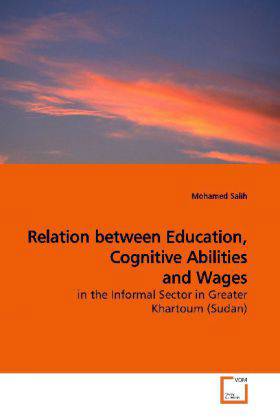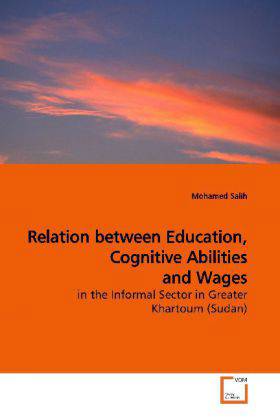
- Afhalen na 1 uur in een winkel met voorraad
- Gratis thuislevering in België vanaf € 30
- Ruim aanbod met 7 miljoen producten
- Afhalen na 1 uur in een winkel met voorraad
- Gratis thuislevering in België vanaf € 30
- Ruim aanbod met 7 miljoen producten
Relation between Education, Cognitive Abilities and Wages
in the Informal Sector in Greater Khartoum (Sudan)
Mohamed Salih
Paperback | Engels
€ 48,45
+ 96 punten
Omschrijving
In this study, education was strongly positively
correlated to wages (p= 0.012, table 6). In our
study we did not investigate which education level
is more effective than the others. As
mentioned before, the expansion in education was
more in the high school than primary
school. Moreover, since the rates of return to
primary school education are generally low
(Cohen B. and W. J. House 1994), we expect high
schooling to be is more effective. Although
education in Africa has a poor reputation, our
results still show a positive effect on wages in
Khartoum.
The results clearly show that education, although
still poor, has a significant relation to wages
in the informal sector in Khartoum. Indeed other
detectable and undetectable factors, e.g.
countries economic growth, social norms and
corruption, do affect the relation between
education and wages. The relationship between
education and cognitive ability and their
interactions on wages are indeed complex and warrant
further investigations including the
impacts of productivity and economic growth.
correlated to wages (p= 0.012, table 6). In our
study we did not investigate which education level
is more effective than the others. As
mentioned before, the expansion in education was
more in the high school than primary
school. Moreover, since the rates of return to
primary school education are generally low
(Cohen B. and W. J. House 1994), we expect high
schooling to be is more effective. Although
education in Africa has a poor reputation, our
results still show a positive effect on wages in
Khartoum.
The results clearly show that education, although
still poor, has a significant relation to wages
in the informal sector in Khartoum. Indeed other
detectable and undetectable factors, e.g.
countries economic growth, social norms and
corruption, do affect the relation between
education and wages. The relationship between
education and cognitive ability and their
interactions on wages are indeed complex and warrant
further investigations including the
impacts of productivity and economic growth.
Specificaties
Betrokkenen
- Auteur(s):
- Uitgeverij:
Inhoud
- Aantal bladzijden:
- 56
- Taal:
- Engels
Eigenschappen
- Productcode (EAN):
- 9783639149166
- Uitvoering:
- Paperback
- Afmetingen:
- 220
- Gewicht:
- 94 g

Alleen bij Standaard Boekhandel
+ 96 punten op je klantenkaart van Standaard Boekhandel
Beoordelingen
We publiceren alleen reviews die voldoen aan de voorwaarden voor reviews. Bekijk onze voorwaarden voor reviews.










